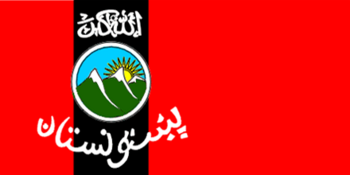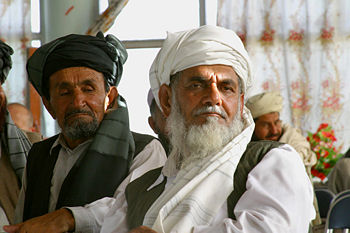Pashtun people
Pashtuns (also known as Pakhtuns, Pathans) are an Eastern Iranian group primarily located in Southern Afghanistan, in the North-West Frontier Province, Federally Administered Tribal Areas and Balochistan provinces of western Pakistan. The Pashtuns primarily speak the Pashto language, although a Dari speaking minority exists. Dari, however, is the lingua franca of Afghanistan. Many Pathans of Balochistan speak Brahui, a Dravidian language. Pathans settled in India mainly of the Lodi clan of the Ghilzai have throughout the centuries adopted the dominant language and Muslim customs practiced around them, although they continue to retain their Pathan identity. Pathan is the Hindustani term for Pashtun.
History
According to Vogelsang (2002), looking for the origin of the Afghans and Pashtuns is like looking for the source of the Amazon river. It's unknown if there's a specific beginning, and whether the Pashtuns were originally identical with other Afghan ethnic groups.[1] Although their culture is different, they do speak an Eastern Iranian language, and many Pashtuns speak Dari, a form of Persian generally associated with Tajik.
In antiquity
Herodotus was the first to mention ethnic groups in mordern Afghanistan, then known as Pakht or Pakhtria, and Bactria in western literature. The term he used for the ethnic group is Pactyans.[2] Although it's not certain if this the Pashtun ethnic group, there are similarities between Pakht, Pakhtun (or Pukhtun), and Pactyan.
Medieval era
Mordern era
In the late 1800's, the Durrani King Abdur Rahman Khan initiated a resettlement program with two goals in mind, firstly, to move his Pashtun enemies as far away from Kabul as possible, and secondly, to break-up and displace the other major ethnic groups. Most Ghilzais were thus relocated to the north of the Hindu Kush mountains, increasing tensions between the Ghilzais and Durranis.
In the late twentieth century, the Marxist faction in the country was led by Nur Muhammed Taraki, a Ghilzai, who organised a coup and overthrew the monarchy, which eventually led to the Soviet occupation. In the aftermath of the occupation, Pashtuns continued to dominate the government. During the occupation, tribal rivalries increased, and were influence by foreign factors. The British invasion of Afghanistan had resulted in the Pashtun homeland being divided between Afghanistan and Pakistan (then considered a part of British India), and the Durrani Kings subsequently refused to recognise Pashtun areas as part of Pakistan, creating tensions between the governments of Afghanistan and Pakistan. After the Soviet invasion, the Pakistani dictator General Zia Ul Haq effectively prevented the Duranni monarchs from having any role in the resistance, thereby preventing any re-establishment of the monarchy and giving rise to the Ghilzai-based Taliban. Meanwhile, the tribal divide remained evident in the Afghan Communist Party, which split into Durrani and Ghilzai factions, with both factions distrusting each other and working to undermine the other faction's power and influence.
Culture
Pashtunwali
Pashtunwali is the Pashtun code of conduct & honour, considered to be a combination of a Knight's chivalry and a Samurai's Bushido. It describes a Pashtun as a man of honour or ghairath, and holds him to a certain standard in conducting his affairs, whether social, tribal, or national. The term "Pashtun" literally means man of honour. Regardless of location, a Pashtun must adhere to the law of Pashtunwali, even with strangers, showing proper hospitality. Pashtunwali holds the guests to certain standards, to refrain from stretching his hosts hospitality to the limits, and to avoid shameful acts. Manliness is a complex ideal in Pashtunwali. A Pashtun must protect anyone who seeks protection, even his enemies fleeing from their enemies. However, if a man has committed a shameful act, such as raping a woman, he then forfeits this right to protection, along with any other right to a Pashtun's hospitality.
Pashtunwali guarantees the protection of the three Z's - Zan (woman), Zar (gold or property}, and Zamin (land). These are the most important assets to a Pashtun, especially the women. Insulting, sexually harassing, or molesting a Pashtun' women can mean ruin for the culprit and his family, as it's the most un-Pashtun act one can do. Violation of any of the three Z's can only be redressed by revenge taking (badlaa). A son can be killed for his father's crime, and vice-versa. This way, a single crime or act can lead to family feuds that may last generations.[3] The phrase "Revenge is a dish best served cold" is of Pashtun origin, borrowed by the British and popularised in the west.[4]
One argument made for the failure of the U.S. "Rewards for Justice" program in Afghanistan is pashtunwali. BBC reporter Frank Gardner explains, “Anyone caught betraying a fellow Muslim risks finding their family dishonored for generations.” He quotes CIA operations officer Mike Scheuer as to its relevance to Osama bin Laden: “He’s been in Afghanistan since 9/11. It’s the third poorest place on the planet. We have $200 million of reward money outstanding, including $50 million for Osama and no one has come forward to take a cent. I think we need in the West to grow up a little bit. Everything doesn’t pivot on money.”[5]
Marriage
Most Pashtuns follow a type of Hypergamy by which they arrange the marriage of their sisters and daughters to other Pashtuns. This is prevalent in Afghanistan, where most ethnic groups marry their womenfolk to within the ethnic group and above it, while the men marry within the ethnic group and below it. As the Pashtuns consider themselves the top ranked ethnic group, Pashtun women may marry only Pashtun men.[6]
Tribes and clans
The two main tribes of the Afghans are the Ghilzai and the Durranis. Traditionally, the Durranis have controlled Afghanistan's political affairs, although the Ghilzai are the majority. In fact, Afghanistan's monarchy was founded by Ahmad Shah Durrani in 1747. The other important tribal groups are the Jaji, Mangal, Safi, Mamund, and Mohmand.
The Durranis are dominated by two main clans, the Zirak and the Panjpia. The Zirak have historically been the elite, and the Afghan royal family came from the Mohamedzai subclan of the Ziraks. Afghan President Hamid Karzai is from the Popalzai subclan of the Ziraks. The Panjpia subclans include the Alizaj, Izhak, Koginaj, Maku, and Nurzai.[7]
The Ghilzais have been well known for their bravery and chivalry for many centuries. They are believed to be descended Khilji Turks by most historians. Traditional historians are however of a different view. According to them, Ghilji and Lodi/Lodhi (Ibrahim Lodhi) were the offspring of Shah Hussain Ghauri off his first wife; Bibi Mato bint Bait Nikka bin Qais Abdul Rashid. According to O'Connel Jr, The Ghilzai are the descendents of the Wu'chi (Indo-European/Turk) which absorbed the remnants of the Tocharian people (Indo-European) after the fall of the Tarim Basin to the Han Chinese.[8] Important Ghilzai clans include the Lodi, Suleiman Khel, Nasir Khel, Hotak, and Kharotis.
Elders play important roles in the clans and all important decisions are influenced by them.
Demography
Notes and References
- ↑ Vogelsang, Willem - The Afghans, page 18, ISBN 0631198415
- ↑ Herodotus - Histories
- ↑ Jones, Adams - Men of the Global South: A Reader, page 368, ISBN 1842775138
- ↑ Halliday, Tony - Pakistan, ISBN 9812585532
- ↑ Frank Gardner (8 April 2009), BBC News
- ↑ Paul V. Galvin Library, Illinois Institute of Technology - Afghanistan Country Study
- ↑ Lansford, Tom - A Bitter Harvest: Us Foreign Policy and Afghanistan, pages 16-17, ISBN 0754636151
- ↑ Khyber.org - Ghilzai
- Pages using duplicate arguments in template calls
- Pages using ISBN magic links
- CZ Live
- Anthropology Workgroup
- Geography Workgroup
- History Workgroup
- Afghanistan Subgroup
- Pakistan Subgroup
- Articles written in British English
- All Content
- Anthropology Content
- Geography Content
- History Content
- History tag
- Afghanistan tag
- Pakistan tag

